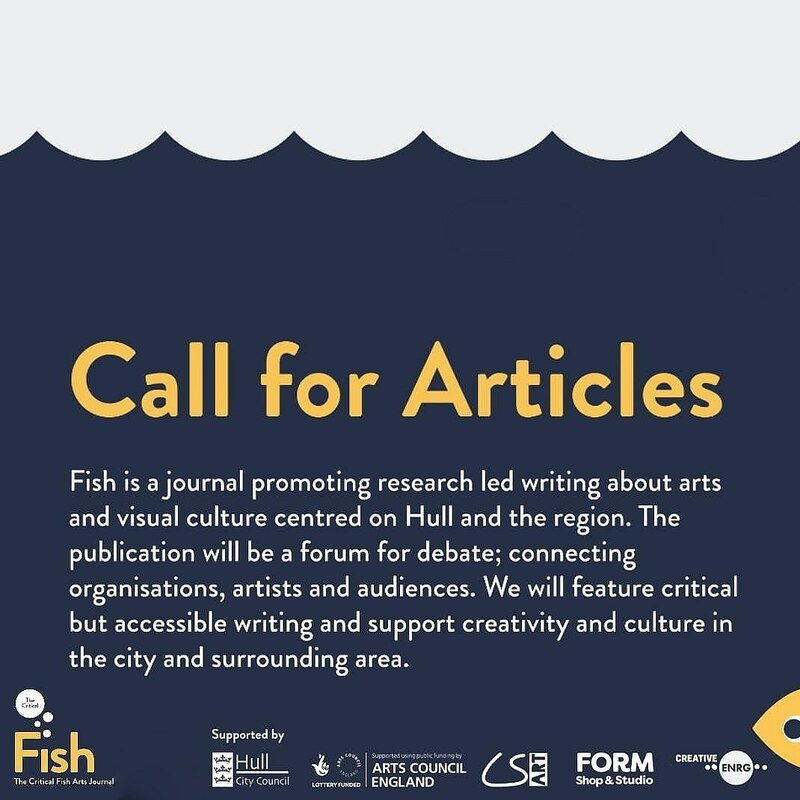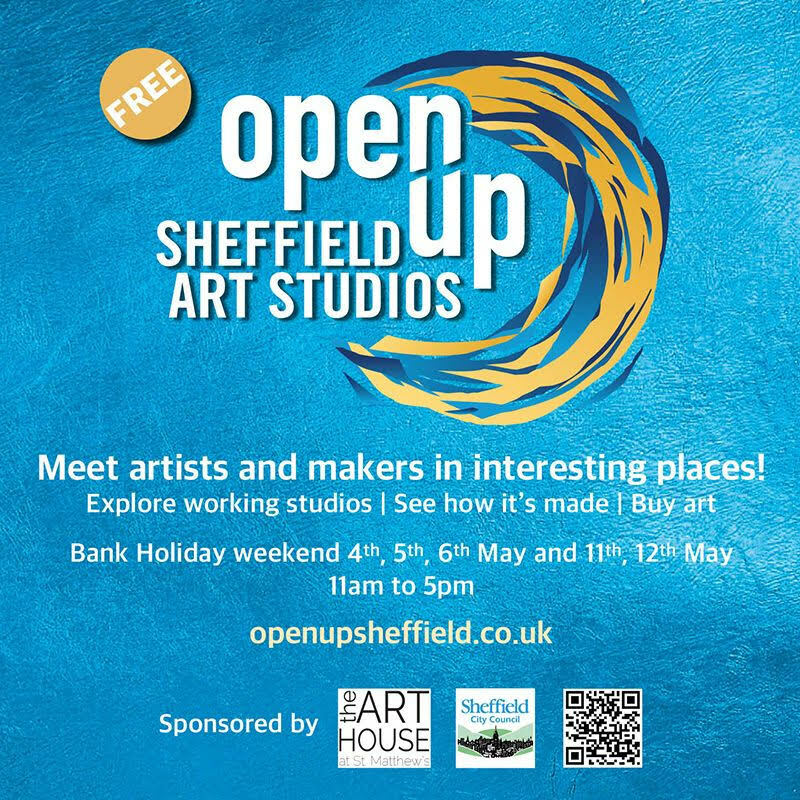Call for Articles - The Critical Fish; Beneath the surface of Arts and Visual Culture
Deadline: 21/01/2019Region: East Yorkshire | Country: United Kingdom | Lauren Saunders Art
Paid opportunity
We're pleased to announce the Call for Articles for our first ever issue (launching May '19)! We are inviting written and visual contributions from UK writers, artists and academics at different stages of their careers to contribute to this Hull based critical arts adventure. We look forward to reading your submissions!
Fish are excited to announce their first Call for Articles and invite writers of all backgrounds to submit their research. We ask that writers read through the Editorial Policy to get a sense of the type of writing we will be publically publishing before sending us work.
Important Timelines
Call for Articles: Saturday 1st December 2018
Final Submission Date: Monday 21st January 2019 (by 11:59pm)
Publication publically available: May 2019
Fish will be going 'on tour’ in December in Hull and East Riding to answer questions about the project - details can be found in the Call for Articles file.
Formatting/Word Count Guidelines
In addition to commissioned written and visual pieces, we are inviting artists and writers to submit work for our first issue. We have created a tier system in terms of word length and payment:
Longer Articles, 1,500-2500 words:
There will be TWO selected longer length pieces, and the two writers selected will be paid £200 each.
Articles, 800-1300 words:
There will be FIVE selected articles or image-based pieces and the five selected writers/artists will be paid £100 each.
Reports, 250-500 words:
We will include some shorter pieces – for example research progress reports or updates on exhibitions and relevant events. Presently there will be no payment for these.
Submission Guidelines
-
One submission, per person, per issue. Submitting work to Fish is free. Only the writers who have their work selected for print will be awarded payment.
-
We welcome collaborative works between artists, writers and academics or from groups, but please note that these will be treated as one submission.
-
Please stick to the word counts given.
-
Please submit your work before the deadline with a fully-completed 'Cover Sheet’ (which can be filled in digitally or printed off/scanned in) and any appropriate imagery. Please save your writing as a Word document with your name as the document title. Images should be sent as full PNG or JPEG files.
-
We will be not be accepting abstracts or making decisions based on any abstracts received; you must send your complete article to us.
-
We will be selecting pieces for the printed version which best reflect the curatorial needs of the publication. The selection of works is the responsibility of the editorial team and their decision is final. This means that articles recieved may be rejected, used in the current publication or used at a later date/on the website only.
-
Your submission should be ‘publication ready’, according to these editorial guidelines. One of the editorial team may contact you to make some changes but we will not be checking or reviewing your work and sending it to and fro for development
-
We will not accept plagiarism. Your work MUST be your own.
-
Do not send us anything that's already been published elsewhere. If your submission is based on a book or essay you have already written, or is from your current academic investigations please reference this fully and correctly.
-
Use referencing to acknowledge other writers’ ideas and theories whether through quotes or paraphrases - please put your references as endnotes or within the text. You are free to use a referencing system of your own choosing. A reference list of sources should be included at the end of your articles.
-
Include Endnotes, especially where it helps the reader, but please don't overload your text with them (we reserve the right to take some out if needed). You are welcome to be creative with footnotes and endnotes if you want to take the experimental approach.
-
If you choose to send an image to accompany your work (which we may or may not print) please ensure you have permission to use it and provide us with evidence. Any image supplied must be high resolution and of good quality (e.g, not blurry). Images should be accompanied by captions which reference artist, title and date.
-
By submitting an article, you have agreed to these conditions, read and understood these guidelines and taken full responsibility for ensuring that everything you share with us is your own intellectual property or copyright free/available.
Our intention is to work with writers at different stages of their careers, so some writing might be more complex, experienced or polished than others. If your article is selected but not quite ready for publication, one of the editorial team will contact you and suggest some changes.
Step 2: After the submission date, the Editorial Board will meet and share out a ‘caseload’ each. Each editor will then read his or her articles and prepare a report/summary for the next meeting. These will be blind read (the author’s names will have been removed) and peer assessed.
Step 3: The Editorial Board will meet again to present and debate the submissions they recommend to go forward for publication. All unsuccessful writers will be notified at this stage.
Step 4: Editors will inform the writers in their ‘caseload’ that they have been successful and discuss any changes that need to be made. At this stage writers should send their bank account details so that we can transfer writer’s fees. Payments will only be made when the selected article has been submitted with all the required changes made – according to the guidance of the matched editor. Further information about this will be given at the time.
Step 5: When ‘publication ready’ the editors and designer will meet to ‘curate’ the publication. This will include how articles are grouped, paired or presented to create conversation/debate or to highlight particular themes. There will also be an editorial introduction/ overview, alongside visual cues and design features to support the reader in terms of themes and navigation.
If we think your work is what we're after but we're unable to publish it in the printed version of Fish, you may be contacted to see if you would still like us to be included on the website without payment. This is your decision.
We’ve stipulated critical and research-led writing:
Critical: ‘Critical’ here doesn’t derive from the traditional art school crit (although we would love to set up some opportunities for those!); but from an intention to ask questions, to challenge orthodoxy and hegemony and to look beneath the surface. We want to move beyond purely descriptive writing and personal judgement to writing that weighs up different opinions or perspectives, evaluates evidence, challenges arguments and conclusions. Critical in this sense, means analytical.
Research-led: by research, we mean the kind of evidence-based exploration that could range from academic enquiry to practice led research.
We envisage that most of the work featured will be in a traditional essay or report format. But we are equally interested in ‘other ways of doing it’. As long as your contribution sits within the definitions of critical and research – led, you could submit a piece of experimental typography, a comic strip, creative writing etc.
The way that you write your contribution (combined with our curation of the publication) should be interesting, informative, thought provoking and challenging. Our readers should discover something new or see the familiar in a new light.
We’ve found the following excerpts from Arlene Raven, who champions ‘writing alongside of’, helpful:
‘The critical context is part of the concept of community, the community that consists of artist and audience for artworks contains, as well, the commentative structure in which the audience and artist may view the process and product of art works’
‘Writing arising from my seeing, attempts to be educational and includes information gleaned from interviews, research and a knowledge of art and history’
‘There is something that can be added to the experience of artworks – data and insights that will place them in literary, geographical, historical, critical, political or thematic contexts’
‘Word of Honor’, by Arlene Raven in Mapping the Terrain: New Genre Public Art edited by Suzanne Lacy.
You must have an account to send a message to the curator of this opportunity. Registering only takes a few moments. Once registered you'll be able to keep track of all of your submissions and get updates on upcoming opportunities.
Already have an account? You must log in to send this curator a message.
Get the latest CuratorSpace news, updates about new opportunities, upcoming deadlines, and art-related promotions.
'Keep It Under Your Hat' - a monthly night of music and poetry in East London is seeking short... Identity, International Photography Exhibition
Call for entries for an International Photography Exhibition. This month-long exhibition will be... Texture, International Photography Exhibition
Call for entries for an International Photography Exhibition. This month-long exhibition will be...


